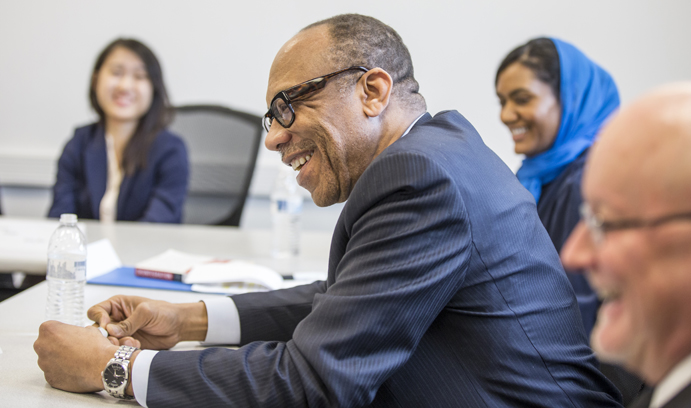The barriers are no longer insurmountable

Washington Post columnist Eugene Robinson also met with students and faculty members during his visit to Lehigh.
When he was 14 years old, Eugene Robinson witnessed the Orangeburg Massacre, in which three persons were killed and 28 injured when police fired into a crowd of protesters on the campus of South Carolina State College. The protest was provoked by the segregation of the only bowling alley in Orangeburg. The incident was the first of its kind on an American university campus.
“There were so many things that happened in 1968 that most people forget about the Orangeburg Massacre,” Robinson, now a columnist with the Washington Post, said in a speech here last week. “But it wasn’t forgotten by me. It played a crucial role in my ambition to become a journalist.”
Robinson’s talk, titled “We’re Someplace We’ve Never Been: Race, Diversity and the New America,” was sponsored by the College of Arts and Sciences and the Africana Studies program.
The history of Orangeburg stayed with him even after he left home for college, Robinson said. At the University of Michigan, he had dreams of pursuing an architecture degree until a freshman writing course changed his path. For one assignment, he decided to write an essay about the massacre. His professor pushed him to enter the essay in a campus writing contest. To his surprise, he won.
“I learned two things,” said Robinson. “One: you can write for money; and two: you can write about things you’re passionate about and people will listen to you.”
After receiving the $200 contest prize, Robinson ditched his architecture plans to pursue a more fitting journalism degree. He became the first black student to be named co-editor-in-chief of The Michigan Daily, Michigan’s school newspaper. The Michigan Daily led to the San Francisco Chronicle and eventually to a three-decade career at the Washington Post, where he has been city hall reporter, city editor, foreign correspondent in Buenos Aires and London, foreign editor and, finally, assistant managing editor.
“Please hold for the President”
In 2009, Robinson won the Pulitzer Prize for commentary for his “eloquent columns on the 2008 presidential campaign that focused on the election of the first African-American president, showcasing graceful writing and grasp of the larger historic picture.” Days after receiving the award, he got an unexpected phone call.
“A woman’s voice came through and told me to ‘please hold for the President,’” Robinson said. “There was this guy on the other end that sounded exactly like [Saturday Night Live comedian] Fred Armisen. He congratulated me for the Pulitzer and said something along the lines of: ‘I just want to let you know I think your columns are thoughtful and fair … Except for that column this morning, which I thought was complete nonsense.’”
Experiences like these have prompted Robinson to think critically about the status of black Americans today.
“This transcendent black America has been completely unimagined in years past,” Robinson said. “African-Americans such as Barack Obama, Oprah Winfrey—it’s not a tremendously long list, but it’s a list at that.”
Though Robinson is optimistic about this group of “transcendent black Americans,” he is not a believer in post-racial America. Incidents such as the 2012 shooting death of Trayvon Martin, he said, show that the nation has a long way to go, despite enormous improvement.
“There is still a huge chunk of black America whose educational and occupational prospects seem dimmer and dimmer rather than brighter and brighter,” he said. “But it’s not what it used to be. It’s no longer an insurmountable barrier.”
Alternating Kumbaya with frankness
As a columnist, Robinson frequently endures backlash for his commentary.
“Sometimes I get emails that say: ‘You people have a black president, what more do you want?’ But we make progress at uncomfortable moments such as these,” Robinson said. “We’re not always going to be holding hands, singing Kumbaya. Sometimes it’s a matter of frankly expressing what’s on our minds.”
Robinson said he is grateful for his livelihood. He writes two columns a week for the Post and is also a political analyst for MSNBC.
His advice to aspiring journalists is to write often.
“It’s a fabulously exciting time to be going into the business,” he said, addressing its dynamic change within the past twenty years. “What intrigues me most is that it’s always new. By definition, every day is different. My first and only addiction was to journalism—I’m hooked.”
“Once I had lunch with the columnist George Will. He said something that I thought was so strange at the time: ‘I just don’t know how anybody else lives without a column.’ Well, that statement really resonates with me now. It’s my way of making sense of the world.”
Photo by Christa Neu
Posted on:

